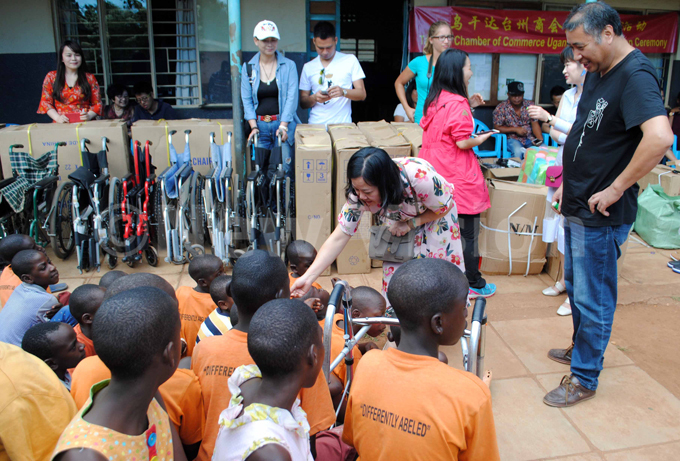Parents blamed for delayed education of handicapped children
“Several parents have no interest in educating handicapped children, and yet if brought early to such schools, they learn fast which opens doors for a brighter future"
Kampala School for the Physical Handicapped in Mengo, a Kampala suburb is a learning center and home to several physical and mentally disabled children from several parts of the country.
It was established in 1969 by the Uganda Spastics Society an indigenous Non- Government Organization, consisting of parents and professionals.
The major aim was to improve the quality of life and rehabilitation of children with cerebral palsy, a brain damage caused by brain injuries or abnormal development of the brain that occurs while a child's brain is still developing before, during and or immediately after birth.
Cerebral Palsy affects body movement, muscle control, muscle coordination, muscle tone, reflex, posture and balance.
More than 50% of the pupils in the school have cerebral palsy; however it also caters for other disabilities including spinal bifida, muscular dystrophy, polio, hydrocephalus, Down syndrome and several other mental disorders.

It started with a capacity of 30 to 40 pupils and over the years the numbers have increased to about 200 pupils of between five to 21 years of age.
Joy Mwesigwa the School Director, noted that many of the pupils are brought to the school at 15 years or even more which denies these children chance to learn faster.
"Several parents have no interest in educating handicapped children, and yet if brought early to such schools, they learn fast which opens doors for a brighter future," She said.
Adding that several parents are ignorant about the existence of such schools in the country and hence calling for more sensitization among Ugandans.
She said this on Thursday, at a handover of equipment to the school by Uganda Chinese Christian Church in conjunction with Taizhou Chamber of Commerce in Uganda.
She stressed that; children with cerebral palsy can improve quickly through rehabilitation which promotes child's development and self-reliance.
The school has several occupational therapists who work tirelessly with the children to rehabilitate, promote and train their activities of daily living.
The children's therapy has several activities such as dexterity, sensorimotor, cognitive, hydrotherapy and social skills all these intended to help pupils to have self-reliance.
"If children are taken to school early, they would be in position to help themselves to toilets, or even signal to a caretaker seeking for help," she said.
The school has four main departments including vocational skills training for children who may fail to make it to secondary schools.
Several of them earn a living through vocation skills like tailoring, something attributed to early introduction to learning, therapy among others
Christine Naddamba one of the teachers at the school further stressed that several parents have no interest in educating handicapped children, and yet they equal chances to attain a better future.
She adds that, vocational skills training top of formal education are extremely important as it equips them with several skills including gardening, screen printing, leather craft, cloth printing, and knitting, which are all essential for a better future.
"Parents need to think positive about their children, we have seen many trained and they are living a relatively happy life," Naddamba noted.
The challenge
The National Development Plan (NDP) 2014 noted that about 10% of children in school have special needs and their access to special needs is hampered by limited technical, human, financial and physical public resources.
And according to the Education Sector Performance Report 2015/2017, a total of 6,957 special needs pupils exist and 1,978(28.4%) have hearing impairments followed by those that are mentally impaired.
A further analysis by gender, indicates that of 6,957 pupils who are categorized as special needs, 3,939 (56.6%) are male and the rest female. The special needs category of Multiple Handicaps (Blind and impaired) is the least, with 4.1%.
Most of the special needs schools in the country are government aided and all run under Universal Primary Education (UPE) to enable them access education where the Government allocates a paltry sh1, 000 per term.
According to Mwesigwa, delay to offer training to a handicapped child derails his/her development, as child can't be self-reliant.
"Children, who are brought here at an early age like six years, learn fast and many of them seat for Primary Leaving Examinations (PLE) competitively compared to 15 year olds," Mwesigwa explained.
Education Ministry reacts
Dr. Danniel Nkaada, a Commissioner in charge of Basic Education at the Ministry of Education and Sports noted the ministry is embarking on sensitization of population on education on children with disabilities.
"The ministry is keen on promoting self-reliance among physically handicapped children through formal education, vocational training a move that will enable them earn a living," He explained.
Urging parents to take their children to special needs schools spread across the country.
What others say
Mable Magooba, one of the pupils a caretaker at Kampala School for the Physical Handicapped in Mengo also called for adverse sensitization of parents on education of children with disabilities adding," These children are adorable, they learn so fast."
Charity Donation
Uganda Chinese Christian Church in conjunction with Taizhou Chamber of Commerce in Uganda donated gifts worth sh20m to Kampala School for the Physical Handicapped inform of wheelchairs, shoes, cloths, and utensils.
Jane Zhang from Uganda Chinese Christian Church in Mengo noted that helping marginalized children through education is another means through which the Chinese community intends to work with Ugandans.
Mwesigwa applauded the Chinese community on the donations adding that it came the right time where the school had a short fall of wheelchairs.
"We needed a number of wheelchairs to transport our children," She said.